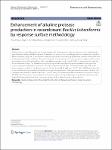Item Infomation
Full metadata record
| DC Field | Value | Language |
|---|---|---|
| dc.contributor.author | Ying, Zhang | - |
| dc.contributor.author | Jingmin, Hu | - |
| dc.contributor.author | Qing, Zhang | - |
| dc.date.accessioned | 2023-04-21T01:41:19Z | - |
| dc.date.available | 2023-04-21T01:41:19Z | - |
| dc.date.issued | 2023 | - |
| dc.identifier.uri | https://link.springer.com/article/10.1186/s40643-023-00641-8 | - |
| dc.identifier.uri | https://dlib.phenikaa-uni.edu.vn/handle/PNK/8182 | - |
| dc.description | CC BY | vi |
| dc.description.abstract | Alkaline protease is widely used in the food, detergent, and pharmaceutical industries because of its comparatively great hydrolysis ability and alkali tolerance. To improve the ability of the recombinant Bacillus licheniformis to produce alkaline protease, single-factor experiments and response surface methodology (RSM) were utilized to determine and develop optimal culture conditions. The results showed that three factors (corn starch content, soybean meal content, and initial medium pH) had significant effects on alkaline protease production (P < 0.05), as determined through the Plackett‒Burman design. The maximum enzyme activity was observed with an optimal medium composition by central composite design (CCD): corn starch, 92.3 g/L; soybean meal, 35.8 g/L; and initial medium pH, 9.58. | vi |
| dc.language.iso | en | vi |
| dc.publisher | Springer | vi |
| dc.subject | alkaline protease production | vi |
| dc.subject | Bacillus licheniformis | vi |
| dc.title | Enhancement of alkaline protease production in recombinant Bacillus licheniformis by response surface methodology | vi |
| dc.type | Book | vi |
| Appears in Collections | ||
| OER - Khoa học Tự nhiên | ||
Files in This Item:

